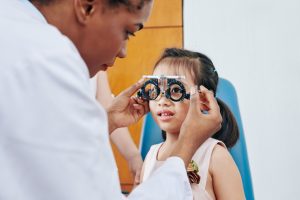
A recent study suggests that pandemic lockdown may have increased myopia, or nearsightedness, in school-aged children.
What is Myopia?
Myopia, also known as nearsightedness or shortsightedness, is a worldwide health issue. Insufficient time outside is a significant risk factor in developing myopia, as well as increased near-work activity.
The 2020 lockdown closed schools across the country and confined millions of children to their homes. While quarantine was essential to protect against the COVID-19 virus, too much time indoors may have negatively impacted children’s vision health.
Lockdown Affected Children Ages Six to Eight the Most
According to research published in JAMA Opthalmology, COVID quarantine may have increased myopia in children ages six to 13 in China, particularly children between six and eight. Researchers suggest higher levels of screentime due to online classes and more time spent on electronic devices negatively affect children’s vision.
Researchers analyzed data of over 123,000 children aged 6 to 13 years from 10 elementary schools in Feicheng, China. The prevalence of myopia in 2020 was higher than myopic rates among all age groups in the past five years.
Experts theorize that less time outdoors affects young children more significantly because their eyes are in an earlier stage of development, and myopia may be easier to control in younger children.
Send Children Outside and Limit Screen Time
Because children’s eyes are so sensitive to environmental factors, parents have an instrumental role in protecting their children’s vision. There are many ways parents can encourage healthy habits in their children during the critical period that can affect myopia:
- Encourage children to play outside every day for at least 40 minutes.
- Limit screen time. The American Academy of Pediatrics recommends no screen time (except video-chatting) in children younger than 18 to 24 months, and only educational media for young children.
- Establish a rule that that there is no screen time within an hour of bedtime. New research from The Sleep Foundation suggests blue light from electronic devices can impair children’s sleep. Artificial light disrupts the natural sleep-wake cycle by fooling the brain into not producing melatonin before bed.
Schedule an Eye Exam Before the End of the Year
Have you scheduled eye exams for your family? A comprehensive eye exam is one of the best decisions you can make for your eye health, and it only takes about an hour. Your eye doctor can assess your visual acuity and screen you for common eye diseases like glaucoma, cataracts and macular degeneration.
Most vision plans cover one eye exam per year per covered individual, so don’t let time get away from you. Call your eye doctor today to make a comprehensive eye exam appointment for the whole family.
